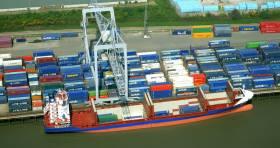Displaying items by tag: Irish Rail & IWT
#Railfreight - It was another year of increases to rail freight traffic on Iarnród Éireann / Irish Rail (IÉ) during 2016 according to MultiModal, with the number of freight trains operated being up 6% and tonnes carried up by 8% on 2015.
In 2015, 96.4 million tonne kilometres of freight were moved by rail in Ireland and this increased by 5% to 101.5 million tonne kilometres in 2016. In that same year multimodal trains serving DFDS Logistics (shipping container operator) increased by 6%. The railway operation is run by Dublin based International Warehousing and Transport (IWT).
IWT commenced their rail operation on 19 August 2008 with just two return trains per week from Dublin Port to Ballina in County Mayo and now with up to seven return trains per week the 2000th train was operated for the company by IÉ on 16th August this year. Two return multimodal services per week are also operated for DFDS Logistics between Port of Waterford (see 2016 overall figures) and Ballina, with shipping connections to Europe via Rotterdam.
Multimodal traffic has been steadily increasing on IÉ now for several years with soft drinks and medical supplies for export being amongst the staple loadings. Rail routes from Dublin and Waterford ports are both cleared for conveying 9’6’’ hi-cube containers on standard platform wagons.
The number of bulk trains carrying pulpwood and zinc ore were also up by 6% on 2015. Pulpwood trains are operated for Coillte from Waterford and Ballina to Waterford where the timber is used for the manufacture of building products, most of which are exported. The ore trains operate twice daily from Navan to Dublin Port from where the product is exported.
During 2016 IÉ successfully completed the trail run of a 54 TEU multimodal freight train, the longest ever freight train run in Ireland.
Other initiatives during the year include ‘Rapid Rail’, a rail parcels service and also parcels collection lockers at principal stations on the network. The IÉ freight sector also operate ‘Navigator’, which specialises in the collection and distribution of automotive car parts. Navigator is amongst the best service of its kind in Europe with 99.6% of all deliveries arriving on time throughout the island of Ireland.





























































